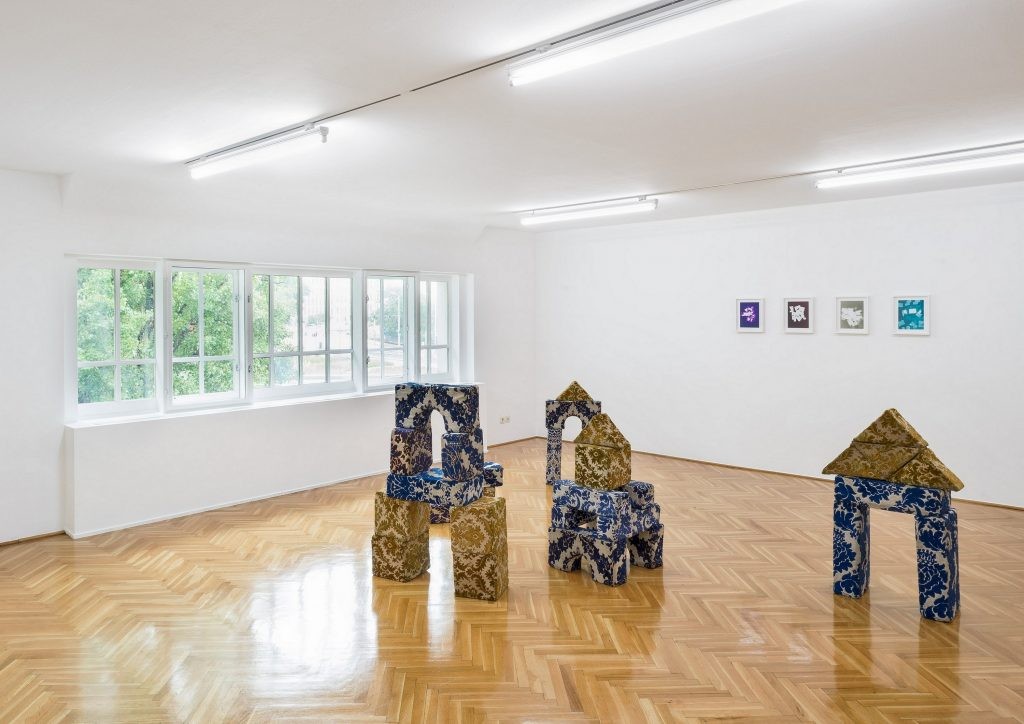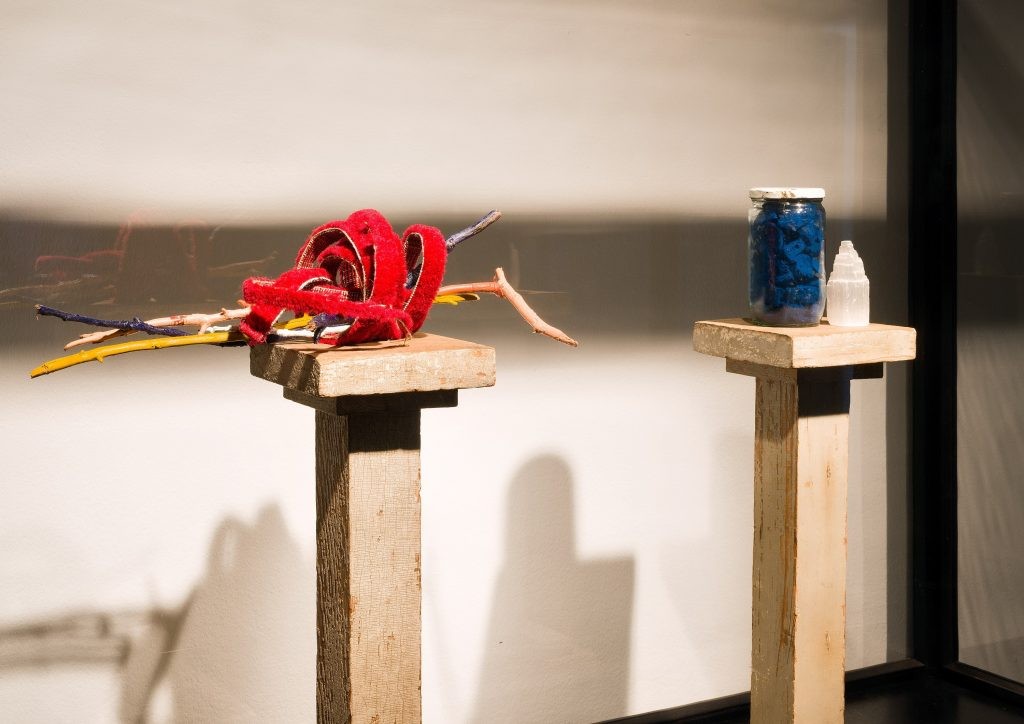Yto Barrada
The Sample Book
08 Sep - 01 Nov 2016
YTO BARRADA
The Sample Book
8 September – 1 November 2016
Yto Barrada’s exhibition The Sample Book presents a new body of work that builds on the artist’s recent major cycle Faux Guide and her study of fossils in Morocco.
In her 2015 film essay Faux Départ (False Start), Barrada takes viewers on a journey through the parallel economy of paleontological excavation sites and “dinosaur tourism” between the Atlas mountains and the Sahara desert, once an inland sea. The “preparators” who unearth, work up—and sometimes counterfeit—fossil evidence demonstrate remarkable skill and knowledge as they prepare ancient pieces for sale or author beautiful hand-molded fake-fossil souvenirs.
Ever since her first major series, A Life Full of Holes: The Strait Project (1998–2004), Barrada has been interested in informal and parallel economies as survival strategies. Her work went on to explore, among other subjects, such forms of “resistance” as smuggling, contraband, the subversion of public space, satire and humor, and magic.
Following the trope of holes and blanks, Barrada focuses not so much on her subjects themselves as on the traces they leave. Her exhibitions often include ‘ready-made’ found objects or daily things overlooked by others, which become iconic in the complex stories she spins.
The Sample Book, like Faux Guide before it, is a constellation of numerous works that function independently of each other while also being integral parts of a larger ensemble. The pieces are so heterogeneous that the connections between them are not readily apparent, but they are tied together by a system of subtle correspondences on the level of content. Their stories become more complex the more intricately the artist intertwines or interweaves the individual elements; more properly speaking, they tell multiple—true as well as fictional—stories.
During her research into Moroccan fossils, Barrada visited a neglected natural history museum, where she discovered a lithological chart, hand-painted by a geologist, in which subtle nuances of color and various fill patterns visualize the composition and age of the geological strata present in a given location. In Barrada’s eyes, the table brings together a wealth of themes that also intersect in her work: investigation, research, aesthetics, and pedagogy. How knowledge is imparted and, even more importantly, how learning as such takes place: these are questions that have figured in her art with increasing prominence.
Yto Barrada’s exhibition at the Secession is her most textile-based exhibit to date. Inspired by the peculiar aesthetic quality of the abovementioned lithological table, the artist translated both the color code (age) and the graphical patterns (rock types) into embroideries and fabrics dyed with natural colorants. The chromatic nuances from the table also resurface in color photograms, works that expand the artist’s hitherto documentary photographic practice by adding a decidedly painterly element. Educational Board (2016) invites the visitors to experiment with combinations of colorful fabric swatches—or, as one might say in light of the correlation between the colors and different geologic eras, to playfully reinvent the world from scratch.
The sample books of the title are laid out in several glass cases: some months ago, the artist embarked on an extensive study of natural colorants and traditional dyeing techniques. Starting out with the idea of transposing the color code from the lithological table into different media such as photography and textiles, Barrada began by systematically testing dyes on materials including cotton, silk, and wool. She then arrayed the resulting hundreds of fabric swatches in accordance with a classification of their own and archived them in sample books. The display includes several example pages that also served as sources as Barrada designed the artist’s book to be published in connection with the exhibition.
Sample books—in which small specimens of a product bear tangible and visible witness to themselves—are relics of a consumer society of the past: they have disappeared almost entirely from commerce today. Perhaps their last redoubt is the household textiles business. As Barrada sees them, old sample books not only hold a distinctive aesthetic appeal, they also speak to the histories of manufacturing and distribution, of economic structures and the hierarchies between producers, wholesalers, and retailers.
The exhibition includes a number of found objects as well as others made out of discarded materials that attest to Barrada’s embrace of the petty and neglected stuff of everyday life: Nest and Indigo (both 2016) exemplify her knack for discovering intimations of complex issues and meanings in the simplest things. Twigs wrapped in a strip of carpet and painted, a pickle jar filled with cobalt, both presented on simple wood pedestals held together by visible nails: these may be read as symbolic references to weaving and dyeing, to clothes as a protective shell, and thus ultimately to the cultural history of humankind. Nougat (2016) offers bars of the sweet (made from sugar or honey, nuts, and egg white) stained in different colors and stacked up in towers in a museum-style display glass case in yet another formal allusion to rock formations, museology, and the methods of scientific visualization.
Finally, Salon Marocain, a set of boxy foam rubber objects inspired by children’s wooden toy building bricks, solicits the visitors’ active and creative involvement in the exhibition. Upholstered with vintage domestic living-room fabrics from Morocco, the blocks gesture back to the opening scene of Faux Départ, in which the camera takes in a hotel’s Moroccan Salon (and the fossils on display in it). The show—which, like all works by the artist, is also a portrait of and meditation on Morocco—thus begins and ends with the same formal framework: a “Salon Marocain.”
The Sample Book
8 September – 1 November 2016
Yto Barrada’s exhibition The Sample Book presents a new body of work that builds on the artist’s recent major cycle Faux Guide and her study of fossils in Morocco.
In her 2015 film essay Faux Départ (False Start), Barrada takes viewers on a journey through the parallel economy of paleontological excavation sites and “dinosaur tourism” between the Atlas mountains and the Sahara desert, once an inland sea. The “preparators” who unearth, work up—and sometimes counterfeit—fossil evidence demonstrate remarkable skill and knowledge as they prepare ancient pieces for sale or author beautiful hand-molded fake-fossil souvenirs.
Ever since her first major series, A Life Full of Holes: The Strait Project (1998–2004), Barrada has been interested in informal and parallel economies as survival strategies. Her work went on to explore, among other subjects, such forms of “resistance” as smuggling, contraband, the subversion of public space, satire and humor, and magic.
Following the trope of holes and blanks, Barrada focuses not so much on her subjects themselves as on the traces they leave. Her exhibitions often include ‘ready-made’ found objects or daily things overlooked by others, which become iconic in the complex stories she spins.
The Sample Book, like Faux Guide before it, is a constellation of numerous works that function independently of each other while also being integral parts of a larger ensemble. The pieces are so heterogeneous that the connections between them are not readily apparent, but they are tied together by a system of subtle correspondences on the level of content. Their stories become more complex the more intricately the artist intertwines or interweaves the individual elements; more properly speaking, they tell multiple—true as well as fictional—stories.
During her research into Moroccan fossils, Barrada visited a neglected natural history museum, where she discovered a lithological chart, hand-painted by a geologist, in which subtle nuances of color and various fill patterns visualize the composition and age of the geological strata present in a given location. In Barrada’s eyes, the table brings together a wealth of themes that also intersect in her work: investigation, research, aesthetics, and pedagogy. How knowledge is imparted and, even more importantly, how learning as such takes place: these are questions that have figured in her art with increasing prominence.
Yto Barrada’s exhibition at the Secession is her most textile-based exhibit to date. Inspired by the peculiar aesthetic quality of the abovementioned lithological table, the artist translated both the color code (age) and the graphical patterns (rock types) into embroideries and fabrics dyed with natural colorants. The chromatic nuances from the table also resurface in color photograms, works that expand the artist’s hitherto documentary photographic practice by adding a decidedly painterly element. Educational Board (2016) invites the visitors to experiment with combinations of colorful fabric swatches—or, as one might say in light of the correlation between the colors and different geologic eras, to playfully reinvent the world from scratch.
The sample books of the title are laid out in several glass cases: some months ago, the artist embarked on an extensive study of natural colorants and traditional dyeing techniques. Starting out with the idea of transposing the color code from the lithological table into different media such as photography and textiles, Barrada began by systematically testing dyes on materials including cotton, silk, and wool. She then arrayed the resulting hundreds of fabric swatches in accordance with a classification of their own and archived them in sample books. The display includes several example pages that also served as sources as Barrada designed the artist’s book to be published in connection with the exhibition.
Sample books—in which small specimens of a product bear tangible and visible witness to themselves—are relics of a consumer society of the past: they have disappeared almost entirely from commerce today. Perhaps their last redoubt is the household textiles business. As Barrada sees them, old sample books not only hold a distinctive aesthetic appeal, they also speak to the histories of manufacturing and distribution, of economic structures and the hierarchies between producers, wholesalers, and retailers.
The exhibition includes a number of found objects as well as others made out of discarded materials that attest to Barrada’s embrace of the petty and neglected stuff of everyday life: Nest and Indigo (both 2016) exemplify her knack for discovering intimations of complex issues and meanings in the simplest things. Twigs wrapped in a strip of carpet and painted, a pickle jar filled with cobalt, both presented on simple wood pedestals held together by visible nails: these may be read as symbolic references to weaving and dyeing, to clothes as a protective shell, and thus ultimately to the cultural history of humankind. Nougat (2016) offers bars of the sweet (made from sugar or honey, nuts, and egg white) stained in different colors and stacked up in towers in a museum-style display glass case in yet another formal allusion to rock formations, museology, and the methods of scientific visualization.
Finally, Salon Marocain, a set of boxy foam rubber objects inspired by children’s wooden toy building bricks, solicits the visitors’ active and creative involvement in the exhibition. Upholstered with vintage domestic living-room fabrics from Morocco, the blocks gesture back to the opening scene of Faux Départ, in which the camera takes in a hotel’s Moroccan Salon (and the fossils on display in it). The show—which, like all works by the artist, is also a portrait of and meditation on Morocco—thus begins and ends with the same formal framework: a “Salon Marocain.”


